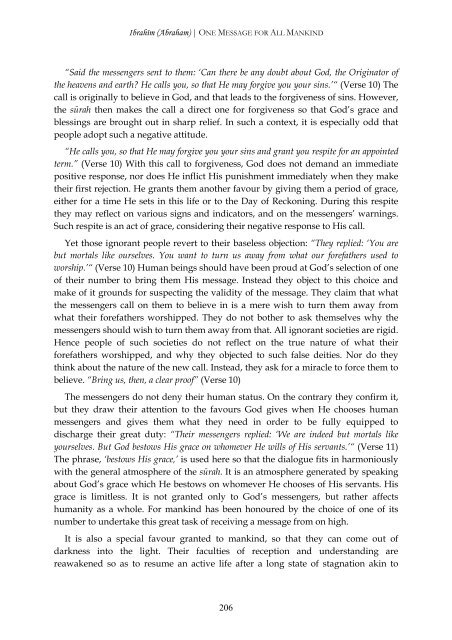Volume 10 Surah 12 - 15 - Enjoy Islam
Volume 10 Surah 12 - 15 - Enjoy Islam
Volume 10 Surah 12 - 15 - Enjoy Islam
Create successful ePaper yourself
Turn your PDF publications into a flip-book with our unique Google optimized e-Paper software.
Ibrahīm (Abraham) | ONE MESSAGE FOR ALL MANKIND<br />
“Said the messengers sent to them: ‘Can there be any doubt about God, the Originator of<br />
the heavens and earth? He calls you, so that He may forgive you your sins.’“ (Verse <strong>10</strong>) The<br />
call is originally to believe in God, and that leads to the forgiveness of sins. However,<br />
the sūrah then makes the call a direct one for forgiveness so that God’s grace and<br />
blessings are brought out in sharp relief. In such a context, it is especially odd that<br />
people adopt such a negative attitude.<br />
“He calls you, so that He may forgive you your sins and grant you respite for an appointed<br />
term.” (Verse <strong>10</strong>) With this call to forgiveness, God does not demand an immediate<br />
positive response, nor does He inflict His punishment immediately when they make<br />
their first rejection. He grants them another favour by giving them a period of grace,<br />
either for a time He sets in this life or to the Day of Reckoning. During this respite<br />
they may reflect on various signs and indicators, and on the messengers’ warnings.<br />
Such respite is an act of grace, considering their negative response to His call.<br />
Yet those ignorant people revert to their baseless objection: “They replied: ‘You are<br />
but mortals like ourselves. You want to turn us away from what our forefathers used to<br />
worship.’“ (Verse <strong>10</strong>) Human beings should have been proud at God’s selection of one<br />
of their number to bring them His message. Instead they object to this choice and<br />
make of it grounds for suspecting the validity of the message. They claim that what<br />
the messengers call on them to believe in is a mere wish to turn them away from<br />
what their forefathers worshipped. They do not bother to ask themselves why the<br />
messengers should wish to turn them away from that. All ignorant societies are rigid.<br />
Hence people of such societies do not reflect on the true nature of what their<br />
forefathers worshipped, and why they objected to such false deities. Nor do they<br />
think about the nature of the new call. Instead, they ask for a miracle to force them to<br />
believe. “Bring us, then, a clear proof” (Verse <strong>10</strong>)<br />
The messengers do not deny their human status. On the contrary they confirm it,<br />
but they draw their attention to the favours God gives when He chooses human<br />
messengers and gives them what they need in order to be fully equipped to<br />
discharge their great duty: “Their messengers replied: ‘We are indeed but mortals like<br />
yourselves. But God bestows His grace on whomever He wills of His servants.’“ (Verse 11)<br />
The phrase, ‘bestows His grace,’ is used here so that the dialogue fits in harmoniously<br />
with the general atmosphere of the sūrah. It is an atmosphere generated by speaking<br />
about God’s grace which He bestows on whomever He chooses of His servants. His<br />
grace is limitless. It is not granted only to God’s messengers, but rather affects<br />
humanity as a whole. For mankind has been honoured by the choice of one of its<br />
number to undertake this great task of receiving a message from on high.<br />
It is also a special favour granted to mankind, so that they can come out of<br />
darkness into the light. Their faculties of reception and understanding are<br />
reawakened so as to resume an active life after a long state of stagnation akin to<br />
206

















